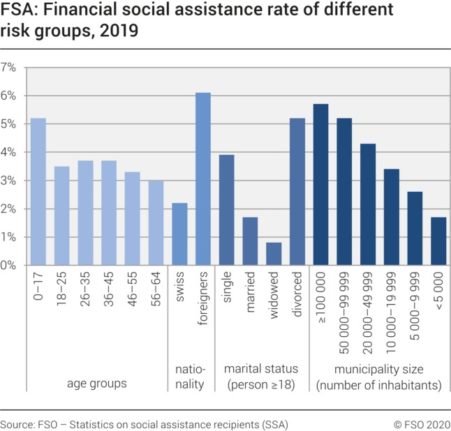Unfortunately for many residency permit holders, there are a number of ways in which this permit can be cancelled for certain activity.
This includes providing false information in an official capacity, committing crimes and threatening public order.
This also includes applying for social assistance.
Switzerland wants immigrants to be self sufficient, meaning that asking for state assistance could be an indication you will continue to do so down the line.
The Foreign Nationals and Integration Act (FNIA) provides for the possibility of downgrading or revoking the permit of a person receiving social assistance.
This means authorities may decide to downgrade permanent residence permits to temporary ones, or withdraw them altogether, if someone has applied for benefits.
The revision of FNIA in 2019 extended the consequences of social assistance even to C permit holders, meaning that sweeping rights and protections normally conferred by this particular permit in relation to long-term permanent residence could be nullified.
This would impact not only third country nationals, but also EU/EFTA citizens living in Switzerland.
To avoid these potentially tough consequences, many foreign nationals abstain from seeking financial help.
A study from Zurich’s University of Applied Sciences showed that during the shutdown in 2020, foreigners were afraid to claim social benefits due to the risk of losing their residence permit.
And RTS public broadcaster also reports that “an increasing number of foreign nationals refrain from requesting social assistance for fear of losing the right to remain in Switzerland”.
There are no official numbers on how many people actually lost their permits after applying for welfare, but the risk is definitely there.
READ MORE: ‘A feeling of belonging’: What it’s like to become Swiss
Do immigrants apply for social benefits in Switzerland?
The rightwing Swiss People’s Party (SVP) often refers in derogatory terms to immigrants who claim welfare benefits as soon as they set foot on Swiss soil.
This stance has sparked a number of anti-foreigner referendums that the party has launched over the years.
Official data doesn’t support this stereotype of money-grabbing immigrants, but figures from the Federal Statistical Office (FSO) indicate that most social aid in Switzerland does go to foreign nationals.

No distinction is made, however, regarding the status of the welfare recipients — whether they are refugees, asylum seekers, or permit holders.
It is important to note that this chart is from 2019 — the latest statistics available to date. They don’t reflect the higher number of people who sought financial assistance during the Covid pandemic in 2020.
In fact, Switzerland has adopted a tough attitude toward immigrants who receive social assistance: for instance, they are excluded from applying for Swiss citizenship if they had been on welfare in the three years prior to their application.
An exception is made if the benefits are paid back in full.



 Please whitelist us to continue reading.
Please whitelist us to continue reading.
Member comments